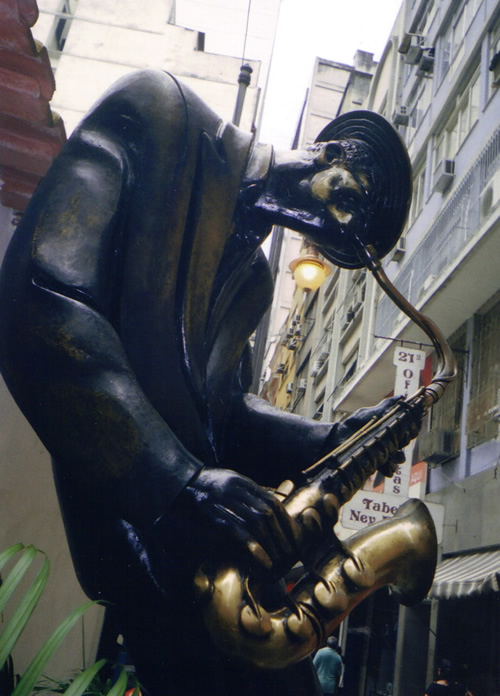|
The Carioca Kangaroo
Becoming a Brazilian in Rio
By Aaron Smith

|
|
Statue in downtown Rio de Janeiro of Samba legend Alfred da Rocha. Photo by Aaron Smith.
|
I never planned to live in Rio de Janeiro. Initially, the city was just the last stop of a round-the-world journey before returning home to Australia. Travel-weary and down to my last $200, I had no idea I was about to create a new life, meet my future wife, and embark on a new career. Rio de Janeiro, meaning the river of January, is an intoxicatingly beautiful city that the locals or Cariocas call the A Cidade Maravilhosa — "The Marvellous City."
Nestled between dome-like mountains, shouldering platinum white beaches, and blanketed with the Floresta da Tijuca, the world's largest forest inside an urban area, this city of nearly twelve million people has a way of seducing you. Once the capital of Brazil and, for a brief period, the center of the Portuguese Empire, Rio's colonial heritage is reminiscent of a great European city. The many historical churches, such as the Candelária Church, the Municipal Theatre, and the National Library of Cinelândia square are some of the Belle Époque landmarks of Rio. All of this under the watchful gaze of O Cristo Redentor, the statue of Jesus Christ, the iconic symbol of Brazil now listed as one of the Seven Wonders of the World. Rio is where samba, soccer, beach, and barbeque are worshipped like a religion.

|
|
The iconic Christ the Redeemer statue above Rio.
|
This is a cultural mixing pot of European, African, and indigenous Indian descent. Walk down any swirling black and white paved footpath on Ipanema Beach at sunset, and you too will be handed an aqua de coco, dance in the street, and clap as the sun sinks into the sea.
A Romance Changes My Plans
Like all the other tourists in Rio, I went up to Cristo, luxuriated on Ipanema Beach, and visited Lapa, the birthplace of samba. I had been chatting online for a month before arriving in Rio with a Brazilian girl I met on a traveler's website. It took quite a bit of convincing to get Vivi to come out and show me Rio through the eyes of a local. Finally, Vivi took me to experience something off the well-beaten tourist track: The Mangueira Samba School. Mangueira is a favela near the downtown area. The favelas, or ghettos, are the other side of Rio, not mentioned in guidebooks. The disparity between rich and poor is never more apparent than when comparing affluent areas like Ipanema to that of the favelas. These shanty towns of red brick buildings are controlled by gangs whose foot soldiers are just young boys with semi-automatic weapons. Streets littered with shells of burnt-out cars, stray dogs, and homeless would generally give the impression of a war zone if it wasn't for all the smiling faces. When we entered, the favela-armed teenagers stared at us suspiciously as they milled about on motorbikes. We were the only gringos in a place not even the police dared to enter.
Outside, the samba school teemed with people. We were soon dancing the gringo two-step with the locals, drinking Caipirinhas, the national drink of fresh lime juice, sugar, and Cachaça, and slowly letting our guard down. Vivi warned me to be wary as I decided to venture from the street side bar to find a toilet. Walking down a lane, turning left and right, I soon became lost in a maze of paths and inadvertently wound up in the heart of the favela. I panicked when a young boy no older than fourteen approached me with a machine gun. Obviously, I had ventured too far and was not welcome. He started shouting at me in Portuguese and put the gun to my head. However, the dire need for a bathroom actually surpassed my fear. With my best bad Portuguese, I explained I just needed a banheiro. He looked incredulous for a moment, then signaled to a small doorway, behind which was a toilet. When I re-emerged moments later, I saw Vivi begging him to let me go. I had apparently not realized the seriousness of my predicament.
After that, I spent my limited time in Brazil trying to convince Vivi to have dinner with me under the guise of thanking her for saving my life. But she was elusive, to say the least, dismissing my pleas until finally agreeing to meet for coffee. I then realized her feelings toward me were mutual. Regardless, she refused to take our relationship any further until I had met her parents. Her father, a taxman and son of a general, was from her descriptions, a formidable character. However, with a few bottles of expensive Australian wine, a couple of well-rehearsed Portuguese words, and tactful remarks about Brazilian soccer, I was soon accepted as part of the family. The fact that I had gone to Maracanã, one of the world's biggest football stadiums, a few nights before and cheered in support as Botafogo claimed victory may have been an advantage. Vivi's whole family, especially her father, were committed Botafogo supporters.
The Decision to Live in Brazil
Then, totally besotted, I was faced with a new problem. My plane ticket back to Australia had been extended to its limit, and I was forced to decide. Stay and risk life in a foreign country with a language I didn't speak, no money, no plane ticket, no job, or return home to Australia and leave Vivi behind. Throwing caution to the wind, I tore up my ticket and decided to risk all for love. My next problem was finding accommodations. Ironically, the only place I found that I could afford was a small apartment in Mangueira. My hostel Maitre'd thought it was insane for a gringo to move to a favela.
Nonetheless, I soon became known as the Carioca Kangaroo on the streets, sitting on the plastic chairs drinking beer with the locals and eating Feijoada, the national dish of black beans and rice, every day at the restaurante popular under Maracanã stadium. For fifty cents a day, this government-subsidized eatery for homeless and poor people became my local and only source of sustenance for my first couple of months in Rio. I was near destitute and struggling to make ends meet while studying an English teacher's course online.
Now, one year later, I am still in Rio, awaiting the necessary paperwork from the Federal Police to allow me to become a permanent resident. I left Mangueira and moved in with Vivi's family until I found a job teaching English in the classified section of the newspaper. It was reasonably easy to get paid work as a teacher; the income is not much, but it is enough to survive. Vivi and I are now engaged and rent a room in a rundown mansion in the jungle at the edge of the Tijuca forest and in between one of the richest and poorest areas of Rio. The high-rise apartments of the affluent Barra Beach decorate the horizon, and the din of the neighboring infamous favela, "City of God," can be heard at night.
Aqua green hummingbirds hover at my window, and small monkeys scurry in the mango and avocado trees above. It's not the flashy carnival or the beautiful beaches that now enchant me but the little things, like how strangers on the bus will hold your bags without question if you are standing, how everyone greets each other with hugs and kisses, and how even the poorest of the poor still smile and laugh. The children who fly kites in the afternoon, sticking glass dust on the strings to cut down opponents in dogfights, the sparkling light show of the home-made hot air balloons floating above the favelas at night, and the banquet of amazing Amazonian fruit juices have all become part of my daily life. Slowly, I am being transformed into a local. I, too, now arrive in Carioca time (perpetually ten minutes late), cook Feijoada on Sundays, and worship samba, soccer, beach, and barbecue. In many ways, it's not so different from my homeland, Downunder, but home is where the heart is. That said, I still have some way to go before becoming entirely Brazilian, not to mention the reams of paperwork and bureaucracy to wade through. Recently, on our first anniversary, I suggested we celebrate by going out and having a romantic dinner, to which Vivi responded:
“Are you crazy, Brazil is playing Uruguay that night, we must go to Maracanã and watch."
|
